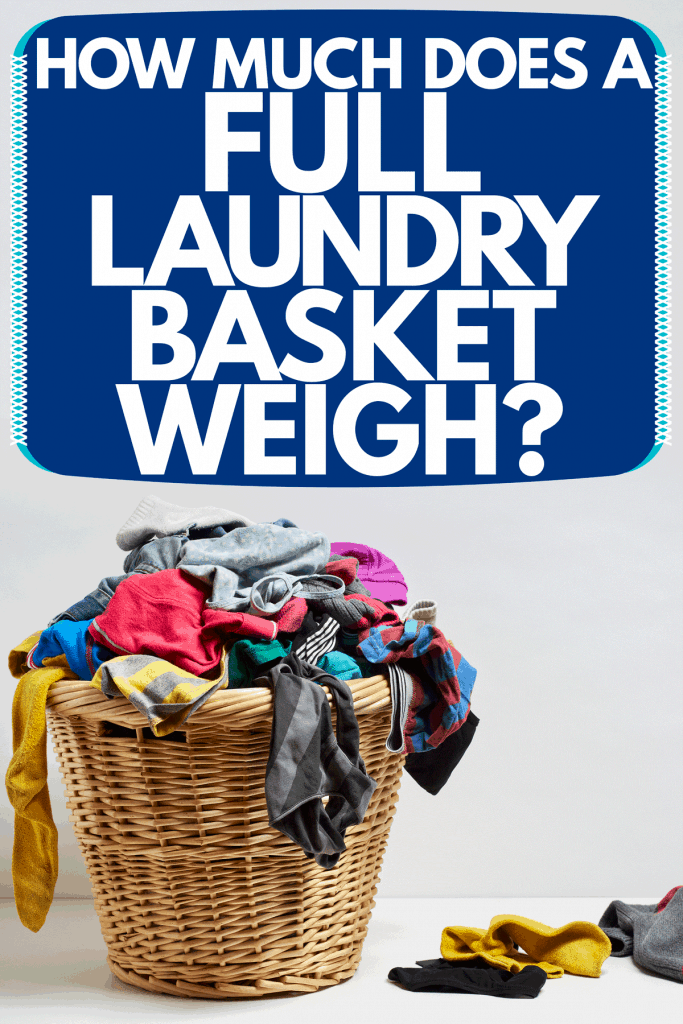Laundry day is one of those weekly events that makes most people wince. No one wants to have to haul all those clothes over to a laundromat, but if you're like millions out there, it's a part of life. If you're like most people, you have a large basket or carryable hamper to haul your laundry to the washing machine. But, how much can you expect it to weigh? A little research revealed quite a lot of knowledge on this topic!
Small laundry baskets will carry about 10 pounds of laundry. If you opt for a typical mesh or cloth laundry hamper with a zipper, you will be able to fit between 15 to 25 pounds without much issue. While many hampers can technically fit more laundry, there is a chance of breakage if you do not carry them properly (the average laundry basket weighs about two pounds).
Knowing how much laundry you have can make a huge difference in your laundromat habits, not to mention your overall cleaning routine. If you ever wanted to know how laundry loading can affect you, this article will prove to be quite useful.

How Can You Estimate Your Laundry's Weight?
When you're trying to estimate laundry weight, never try to do it as a wet weight. When we discuss laundry weight, it's about the clothes when they're dry. So, there are several ways that you can estimate your laundry's weight.
The problem with trying to estimate weight via a laundry basket is that there is an exceptionally wide range of hamper sizes used for laundry. For the sake of getting the most accurate depiction, we're going to suggest you do the following:
- Weigh yourself on a scale. Note the number.
- Grab your filled laundry basket, and weigh yourself on the scale while you hold it. Note this number too.
- Subtract the first number from the second, and you'll know exactly how much your laundry weighs. This is particularly handy if you have to estimate the cost of laundry cleaned by the pound.
How Much Laundry Can A Washing Machine Hold?
Now that you have a good estimate of how much laundry you have, it's important to understand how much laundry you can expect your machine to hold. This quick list will give you a good idea of how much each washing machine type can hold comfortably:
- A standard washing machine (3.1 to 4.0 cubic feet) can hold between 12 to 16 pounds of laundry.
- Large-sized washing machines (4.5 cubic feet) can hold up to 20 pounds of laundry per load.
- Extra-large, commercial size machines (6+ cubic feet) can wash up to 25 to 30 pounds of laundry.
How Many Loads Of Laundry Per Week Is Average?
Now that you have a general idea of how much laundry you have, let's determine how you measure against a typical American family. A recent study showed that the average American family accrues eight to 10 loads of laundry per week. Assuming an average family size of three people, that makes approximately three loads per person, per week!
Sounds like a lot of money and time to spend on laundry? It is, but you have to remember what you're getting out of the deal. The laundry includes a bunch of things, including bed sheet fabrics and clothing. Needless to say, it takes a lot of washing to make sure that you have clean clothes and sheets every day.
What Is Considered To Be A Large Laundry Load?
A large laundry load isn't actually calculated by weight. Rather, it's relative to the size of the laundry machine that you're using. A large load of laundry is defined as having enough clothing to fill the washing machine 3/4 of the way up to the tub. Believe it or not, washing machines are not supposed to be filled to their maximum capacity, as this can impede the machine's ability to clean things properly.
On a similar note, a medium load is 1/2 full. If you are just doing small loads, you should only fill up the washer 1/3 of the way. By knowing the size of each load, you can adjust your water levels to the correct setting. If you have a front-loading washer, then you may not have to worry about setting the water level at all. Most front-loading washers automatically calibrate their water levels based on the weight of the clothing inside.
How Much Laundry Should You Add To A Dryer?
Small loads for a dryer tend to be slightly smaller than the washer. A small load is 1/4 of the way full with dryers, which translates to three to four items. A medium load is 1/2 full, and a large load is 3/4 full. When using a dryer, do not incorporate dryer balls into the size of your load. They're added after the laundry to soften towels and other items, anyway.
How Much Does It Cost To Launder A Large Load Of Laundry?
Most laundromats will have their own prices, especially when it comes to formal wear and button-down shirts. However, if you're just talking about regular day to day clothing, a laundromat will charge between $1 to $2.50 per pound. Most laundromat loads will be around 20 pounds, which means that you should expect a price range between $20 to $50 per load.
Is It Better To Do Small Loads Of Laundry?
Among many laundromat-goers, there's a worry about having to sacrifice clothing quality as a way to save money on having to do multiple laundry loads. This is actually an old wives' tale. Doing smaller loads of laundry does not impact the quality of your clean clothes in a significant manner.
The only reason why you may want to do smaller loads deals with clothing sorting. If you have fabrics that are not colorfast, it's better to wash them separately. This prevents staining and bleeding but also means that you will probably have smaller loads than if you dropped the entire hamper in your machine.
How Do You Know If Your Washing Machine Is Overloaded?
An overloaded washing machine is no good for your clothing. Overloading your washer can cause poor washing, stuck detergent, and poor rinsing. It's important to know when your machine is showing warning signs of an overload. Thankfully, this is pretty easy to do.
To do this, open up the washing machine and put your hand against the outside of the drum. If you can slip your hand inside, then your washing machine is fine. On the other hand, if you can't fit your hand inside the drum, it's overloaded. Moreover, you should also take a look at the proximity to the machine's capacity. Whenever possible, don't max out the capacity!
Should You Wash Denim?
One thing you may not realize about laundry loads is what actually needs to be cleaned. Denim jeans are one of the most commonly-mistaken pieces of clothing in your hamper. Believe it or not, designers actually don't want you to wash denim regularly. Doing so can harm the fibers of your jeans and also potentially shorten the lifespan of your clothing.
A better way to determine if you should wash your jeans is to look at them and smell them. If you notice stains or a foul odor, it probably is time to clean them.
Conclusion
Most people don't realize how much laundry they have every week. If you just started to put together your own laundry hampers and are new to trekking to the laundromat, you might be in for a shock. Most people will need to have at least three laundry loads per week, per person in their home. It's a lot of laundry that you're going to have to do!
The good news is that you usually don't have to worry too much about doing small loads. As long as you have the capacity for it and don't overload your washer, you will be able to save some money and time by going for larger loads. With a keen eye for following laundry instructions, you'll be amazed at how simple doing your laundry can be.


![Epoxyshield vs. Rocksolid: Which is Better? [Pros, Cons & Differences Explained]](https://homedecorbliss.com/wp-content/uploads/2023/08/shutterstock_1764682379-600x400.jpg)
